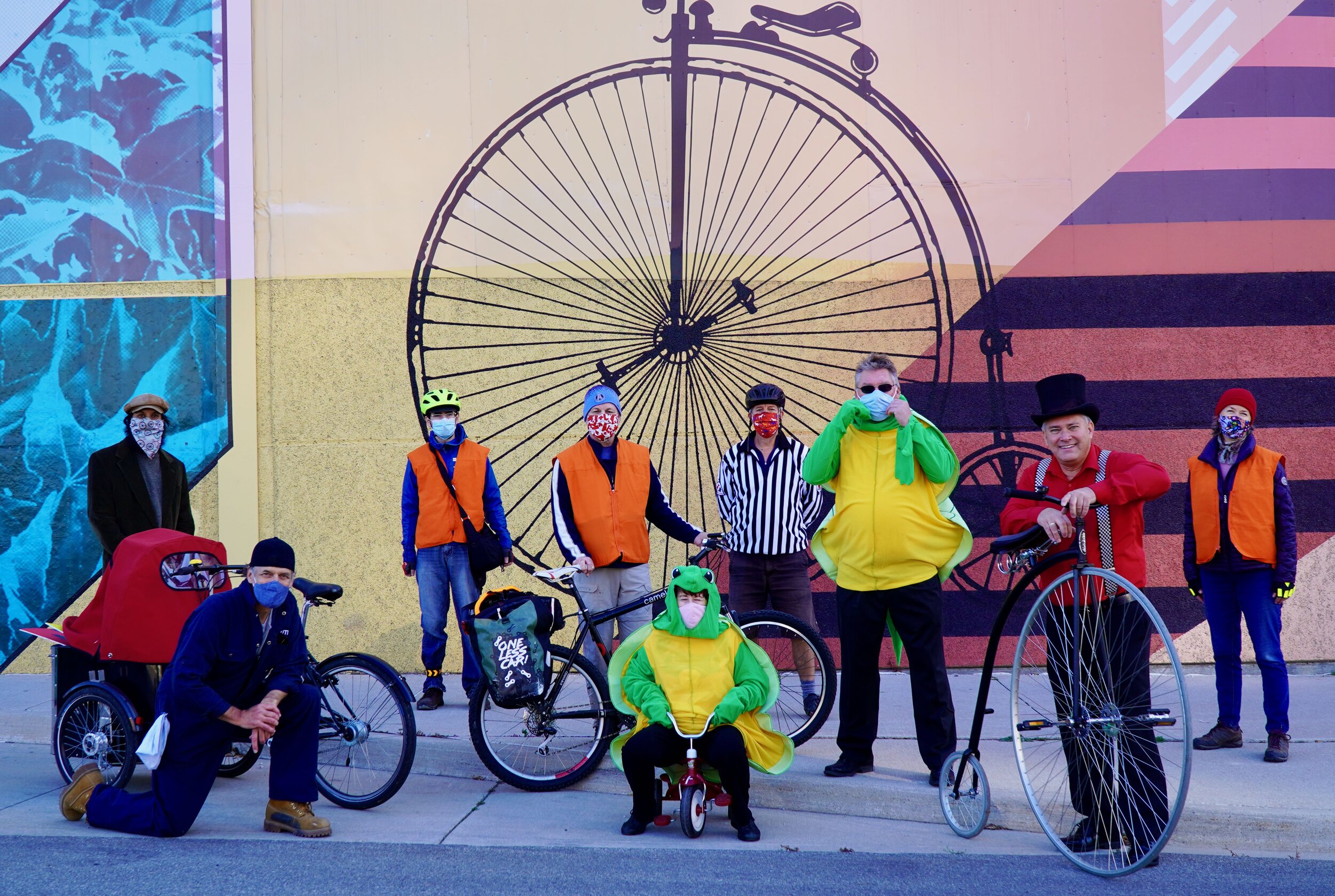
Our Story
Community Bikeways --- aka the Toronto Community Bikeways Coalition (TCBC) --- was initially established as a community-based campaign advocating for 100 kilometres of temporary bikeways to mirror the busiest TTC bus and subway routes. We believed that Torontonians required safe transportation options during the unprecedented challenges of the COVID-19 pandemic. Our May 14, 2020 letter was signed by over 120 Toronto-area community groups who shared our call for temporary bikeways to be implemented on an urgent basis, including bike lanes along the arterials of Bloor-Danforth and Yonge Street. We pushed for these open-air installations for the benefit of essential workers and other city residents who were wary of contracting Covid in the otherwise confined spaces of TTC vehicles or taxis. In 2020 city residents saw the building of a record amount of new cycling infrastructure, totalling 30 kilometres (net) of new bike lanes. But there was clearly more work to be done.
In June 2020, we more formally constituted ourselves as a coalition, bringing together groups such as Bells on Bloor, The Reading Line, Toronto East Cyclists, and Bells on Danforth. These groups maintained more or less independence depending on their particular history, interests, and priorities.
In November 2025, Community Bikeways became a registered Ontario Not-for-Profit governed by a Board of Directors.
Today our advocacy work has transitioned to the following priority areas:
1. Hold governments --- mainly, but not exclusively, Toronto City Hall --- to account for their climate, road safety, and cycling plans and policies. In the case of Toronto, our accountability priorities are the Vision Zero Road Safety, TransformTO Net Zero, and Cycling Network plans. Soon after the formation of our group, the city responded positively to our call for an annual progress report on cycling infrastructure in the city. Last year, the city released its fourth annual Year in Review Report – a welcome contrast to the days when transparency about the progress achieved in a given year required careful investigation. In addition to our own monitoring of city plans and policies, we support, collaborate with, or a member of, a range of coalitions such as the Toronto Climate Action Network (TCAN), Green Neighbours Network, and RideFair.
2. Undertake Policy and Law Reform. The Coalition to Reduce Auto Size Hazards (CRASH) is among our key undertakings. Pickups and large SUVs are 3.5 times more deadly than sedans in crashes with pedestrians and cyclists – and up to eight times more deadly in crashes involving children. Curtailing the proliferation of pickups is therefore a matter of vital importance to road safety. This initiative seeks reforms at the federal, provincial, and municipal levels. CRASH, which was started by a coalition of Toronto-based groups, has grown to 26 groups from coast-to-coast. The coalition has benefited from the guidance and contributions of several lawyers and law students on key legal and jurisdictional issues.
TCBC is also engaged in advocating for proper government regulation of e-bikes (and food delivery companies), so that the growth in city cycling --- including from e-bikes --- is not undermined by larger, sometimes intimidating vehicles in the bike lane.
3. Build a healthy, efficient, climate-friendly transportation system based on walking, cycling, and transit. Although “bikeways” is in our name, we recognize that increasing the cycling mode share also means promoting walking and transit, while discouraging car use and its associated (massive) space demands. For example, we created Gardiner East Transparency (GET) with a large coalition of community groups. Our objective was to push the city to update its cost estimates --- including potential revenues from land sales --- for the Gardiner East teardown and rebuild at a location further north. This initiative garnered significant public attention until Mayor Olivia Chow and Premier Doug Ford worked out a deal to upload the expressway. Among other initiatives, during the 2022 election we promoted three Road Safety Calls to Action, which were endorsed by 12 successful candidates, and subsequently by mayor-elect Chow in June 2023. We do not shy away from election campaigns. We endorse and publicly support candidates who are friendly to the cause of road safety, climate action, and public health. We also advocate on matters such as new rules for construction projects that infringe on bike lanes/sidewalks, Transportation Demand Management, and new measures to reduce illegal parking in bike lanes.
4. Support fledgling cycling and road safety advocacy groups and initiatives. Our work has taken us to all parts of the city, including for events and initiatives in Scarborough, York, Etobicoke, and North York: bike repair events, International Parking Day, bike counts, Bike Days, special rides, and our annual Cycling Good Cheer ride. We pride ourselves on amplifying the voices of grassroots road safety groups. Our Board of Directors counts among its members individuals with many years of advocacy and related experience and expertise that they are happy to share (if asked).
5. Pursue Select Advocacy Campaigns. While we play a supportive role for new bikeways across the city, we continue to play a leadership role in advocating for specific projects such as the Bloor West Complete Street Extension (and completion of the bike lane to the Mississauga border). The We Belong on Bloor campaign started in 2021 was effectively a continuation of the work of Bells on Bloor, founded in 2007 (Bells on Bloor is a founding member of TCBC). In November 2025, we launched our Closing the Loop Trail campaign aimed at completing a 73km loop of mainly off-road trails around Toronto.
Comprehensive surveys indicate that there are now over one million adult, utilitarian cyclists in the City of Toronto. Fortunately, there are also a growing number and diversity of community groups that advocate for these cyclists, or call for safe roads to serve prospective cyclists. Groups such as Women’s Cycling Network, Yonge4All, Etobicoke Voice, Friends and Families for Safe Streets, and Hijabs and Helmets appeal to different audiences, while drawing on new volunteer bases. It has been our pleasure to collaborate with these and many other road safety groups on a variety of initiatives.
Going back farther in the city’s cycling advocacy history, some members of our group were personally involved in meetings leading up to the successful creation of Cycle Toronto in 2008. Dave Meslin, the founder of Cycle Toronto (originally known as the Toronto Cyclists Union), intended the new group to speak for city cyclists - instead of supplanting existing groups - when a unified voice was needed on a particular issue.
Today, Toronto’s many complementary cycling advocacy groups are a tribute to the popularity of cycling and the passion that a largely volunteer-driven movement brings to the fight for a safe, affordable, efficient, and climate-friendly transportation system.

